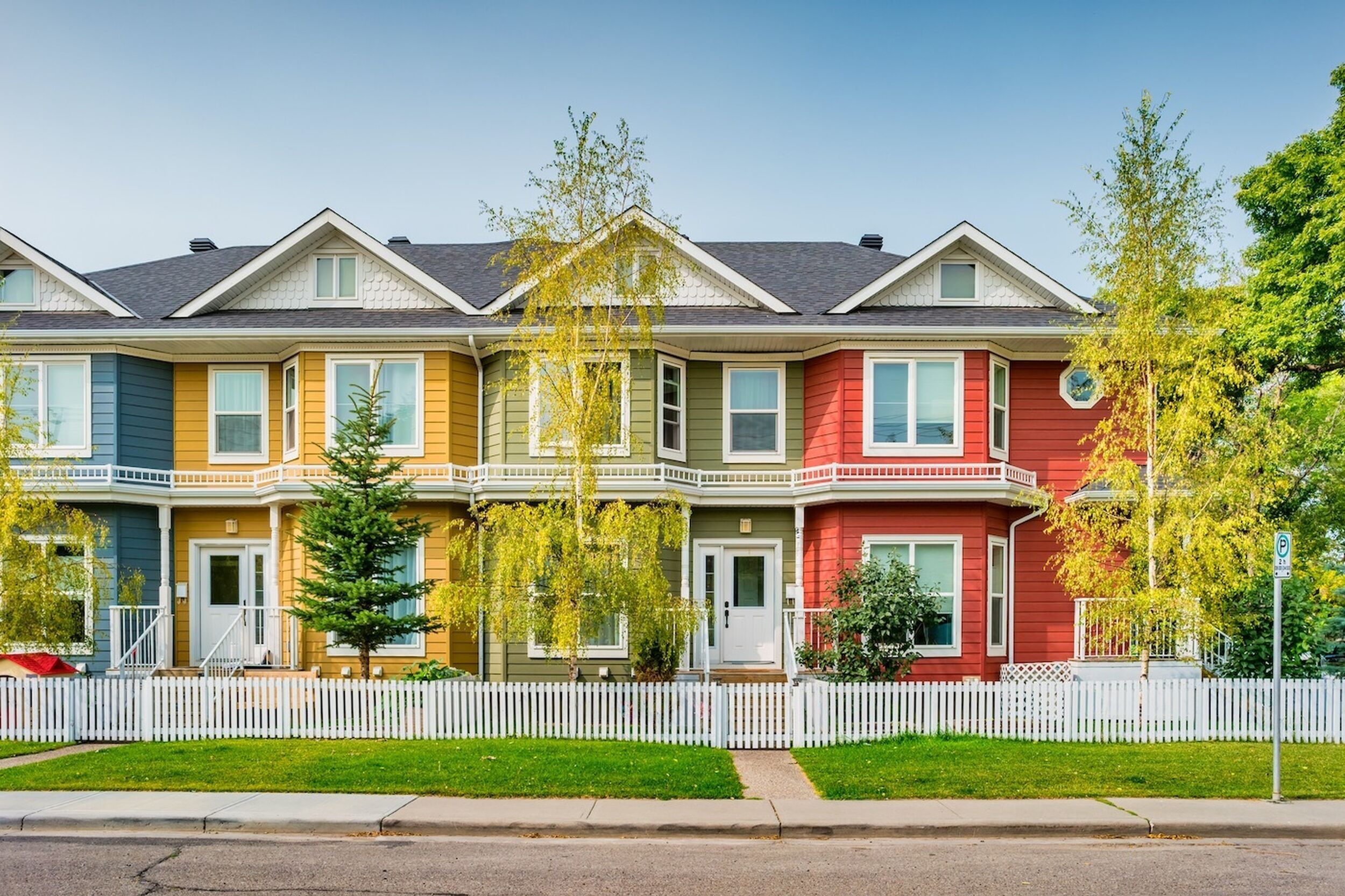
Calgary townhouses. Photo: iStock/benedek
Who’s behind the anti-guidebook ads in Calgary?
Some groups are more transparent than others.
Support independent Calgary journalism!
Sign Me Up!The Sprawl connects Calgarians with their city through in-depth, curiosity-driven journalism. But we can't do it alone. If you value our work, support The Sprawl so we can keep digging into municipal issues in Calgary!
This week, Calgarians woke up to something highly unusual in the realm of civic politics. An unnamed group had bought the entire front page of the Calgary Herald.
The two-page ad warned that the Guidebook for Great Communities, which goes to council on Monday, “will change your neighbourhood forever.” There were no names attached to the ad—no individual names, nor an organization name. Just a website URL: calgaryguidebook.ca.
“If you want Calgary to continue to be a great place to live, it’s time to speak out against the Guidebook for Great Communities,” read the ad.

The guidebook has been in the works for well over a year, and doesn’t change zoning—but would introduce new Local Area Plans throughout the city that would guide redevelopment. (For more specifics on what the guidebook would do, check out Ximena González’s recent story in The Sprawl.)
This week, Calgarians across the city were targeted by ads and text messages from different groups trying to sway public opinion on the guidebook—including a provincial political action committee, a southwest community association and a website that is not forthcoming about who is behind it.
It’s important to know where your information is coming from, so we took a closer look.
An anonymous website
The group behind calgaryguidebook.ca ran two extraordinary ads this week: the front-pager in the Herald, and an advertorial in Avenue magazine. In media interviews, Ward 11 councillor and mayoral candidate Jeromy Farkas has repeatedly directed Calgarians to the site.
But the website is cloaked in shadowy anonymity, saying only that it is “organized and sponsored by individual Calgarians with no prior affiliation other than a love of the already great communities in which they've chosen to live.”
In 2020, the website said it was run by “a group of about 50 community associations with an interest in planning… We have a vested interest in seeing that new development is sensitive to our community’s character and what residents value.” But no specific community associations were named.
After The Sprawl reached out to the generic email address on the website this week, Lisa Poole, a spokesperson for the group and a resident of Elbow Park, wrote back.
In an interview, Poole acknowledged that she was one of multiple people who helped pay for the ads, but wouldn’t disclose how much it cost, or who else contributed, saying only that it was a “community-driven” effort, not a political one.
“From my perspective, the issue isn’t ‘who paid for the ad,’” said Poole. “It’s: ‘Why did people feel like an ad like that was needed?’”
“I think the story really is that that is what community members had to resort to in order to get some attention on this issue. And people were feeling really shut down by the city.”
From my perspective, the issue isn’t ‘who paid for the ad?’ It’s ‘why did people feel like an ad like that was needed?’
Poole says people are afraid of being publicly associated with the ad campaign.
“People are scared,” she said. “People have different businesses... Everyone’s scared of repercussions, which is very disappointing—that people are fearful of speaking openly.”
In the paid advertorial that ran in Avenue this week, the group quoted Brent Toderian, Vancouver’s former chief planner, talking about the importance of neighbourhood “personality.”
Toderian, who previously worked for the City of Calgary, rebuked the group publicly for misquoting him.
So an anti-change community group in Calgary has an advertorial in @AvenueMagazine that selectively misquotes me prominently.
— Brent Toderian (@BrentToderian) March 15, 2021
You probably picked the wrong planner to do that to.
Lets be clear — “large detached housing only” is not a “character.” https://t.co/ItCSH8vvYh
Asked about this, Poole said there was no intent to mislead.
“These are just ordinary people trying their best—certainly not trying to spread misinformation,” she said.
Elbow Park Residents Association
Elbow Park, an affluent inner-city neighbourhood just south of Mount Royal, has been running citywide Facebook ads this week directing Calgarians to calgaryguidebook.ca—with similar language to the Herald ad.
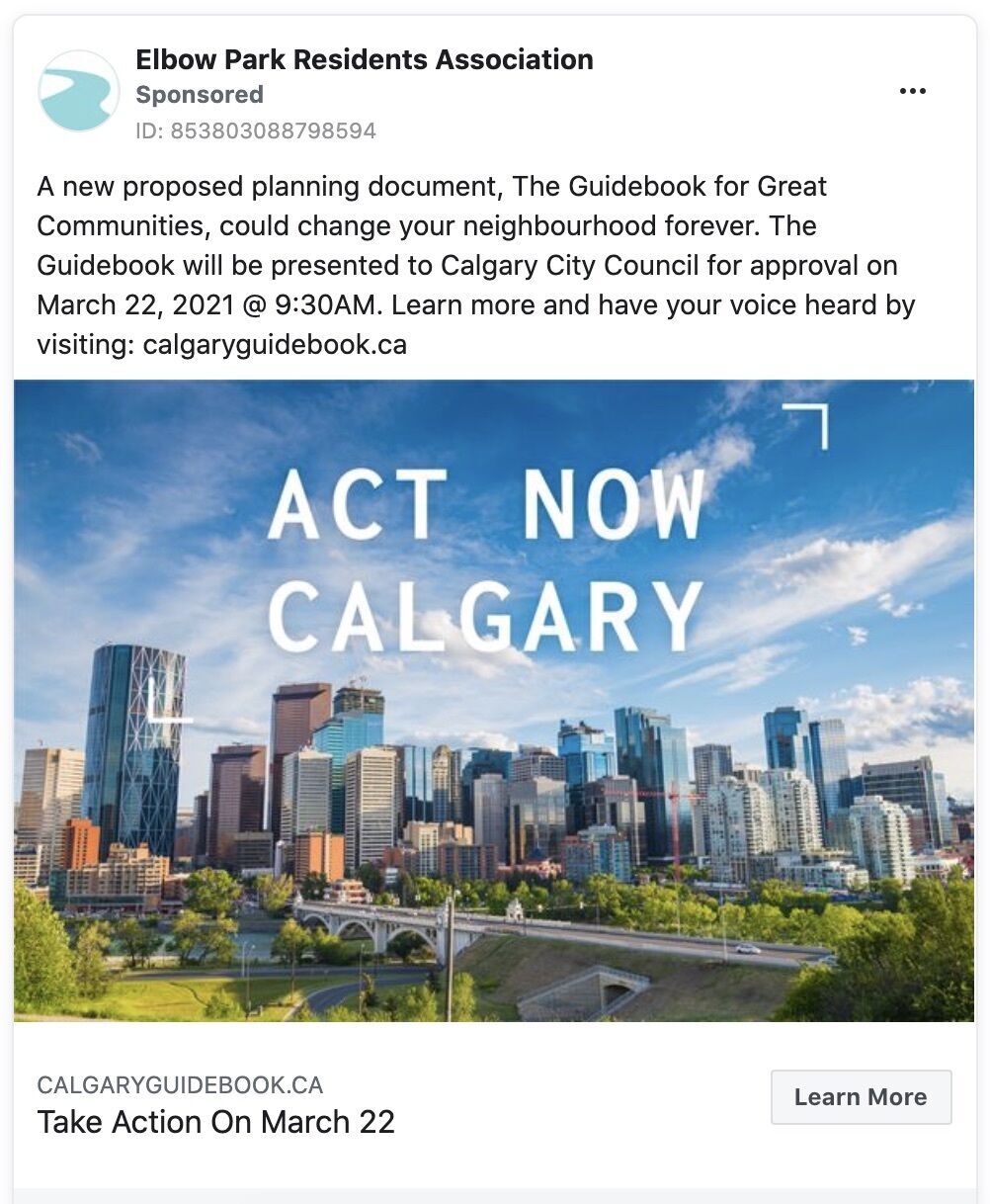
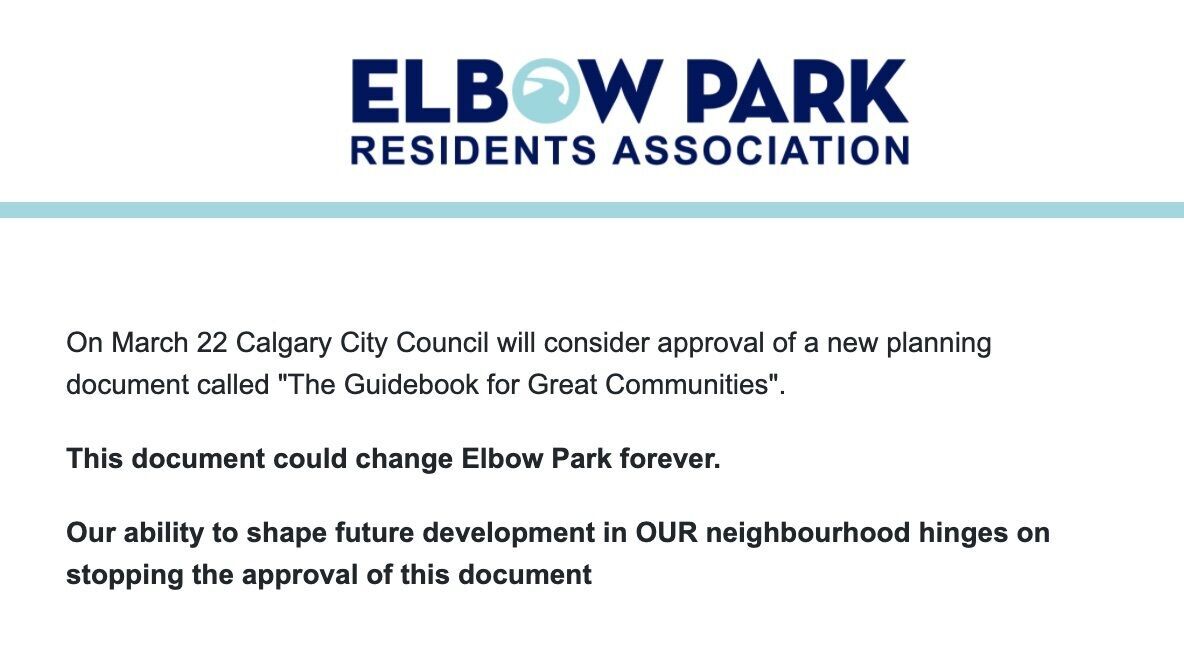
Poole is on the board of the Elbow Park Residents Association as community relations director and sits on the development committee. However, she says the calgaryguidebook.ca campaign is not driven by the Elbow Park Residents Association, and that Elbow Park joined that effort well after other community associations got it started.
“We are a very loosely-organized group of communities," said Poole. "There’s no actual entity per se—it’s very fluid… We are just regular people who are trying to have our voice heard.”
Last year, a group of community associations submitted a letter to city councillors raising numerous concerns with the guidebook. Signatories included 17 community associations including Elbow Park, Inglewood, Brentwood and Hillhurst Sunnyside.
In a statement Saturday, the Hillhurst Sunnyside Community Association (HSCA) said it is not opposed to the guidebook and is disappointed to see a “coordinated campaign of misinformation, which includes inflammatory communications from some councillors’ offices, throughout the engagement process.”
The HSCA points out that the guidebook does not change zoning for residential properties.
Running citywide Facebook ad campaigns is highly unusual for a community association. But Elbow Park stands out in several ways.
In 2015—the most recent year for which the City of Calgary has detailed community data—the neighbourhood was 98% single family homes, with no apartments or rowhouses.
Elbow Park is also significantly wealthier and less diverse than Calgary as a whole. In 2015, Elbow Park’s median household income was $296,866, more than triple the citywide median income of $97,329.
Meanwhile, only 6% of the population was a visible minority, compared with 36% citywide.
The community association is urging residents to ask city council for “a housing category to preserve neighbourhoods of single-detached family homes.”
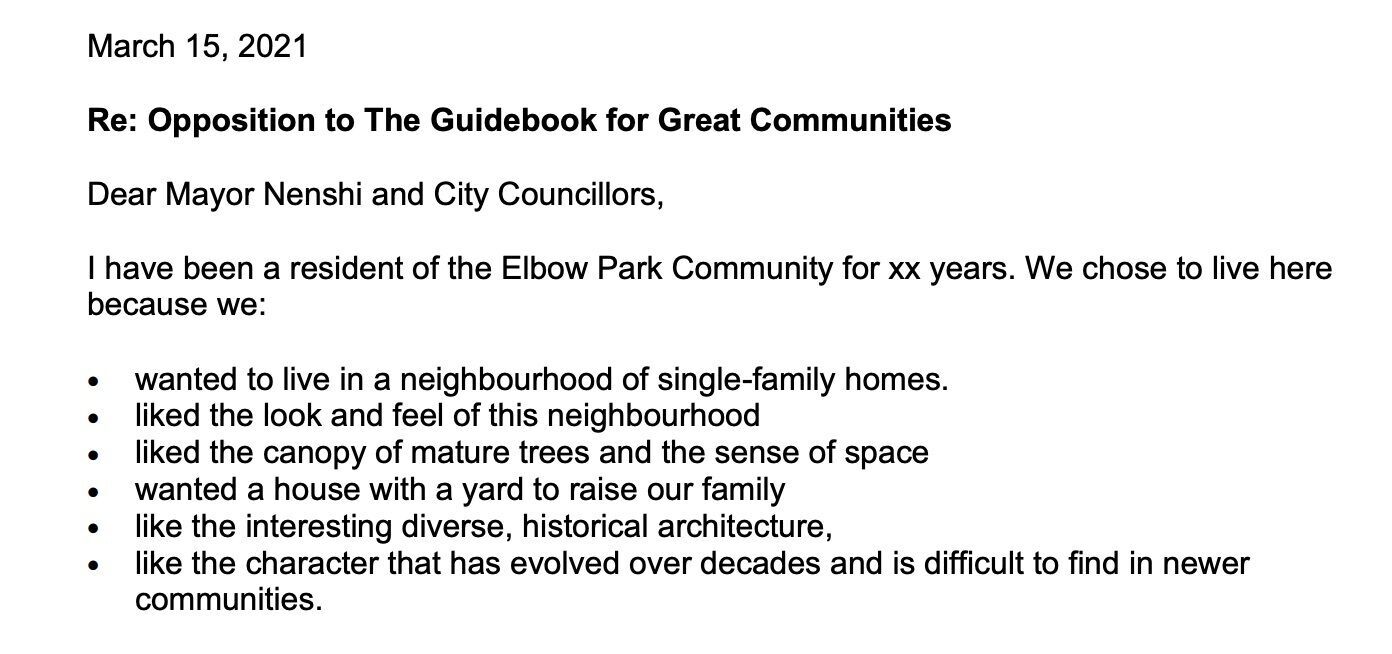
Alberta Proud
Alberta Proud is registered with Elections Alberta as a political third-party advertiser—or what’s more commonly known as a political action committee (PAC). The group was very active in the run-up to the 2019 provincial election, running various anti-NDP and anti-Trudeau memes.
Now the pro-UCP PAC is involved in Calgary municipal politics, too.
This week the group has been texting Calgarians and directing them to an anti-guidebook page on the PAC's website.
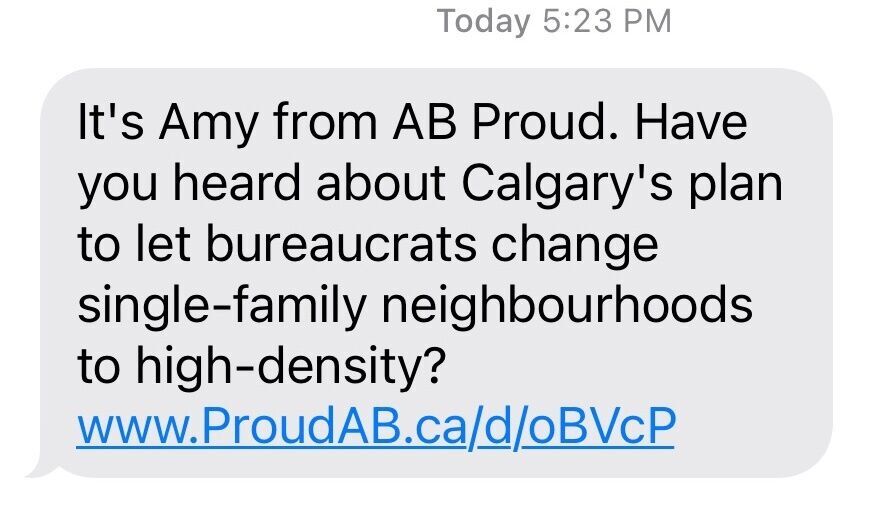
Alberta Proud has purchased 13 anti-guidebook ads on Facebook, most of which have run in the past week, according to Facebook’s Ad Library. One ad is a video that runs over three minutes.
The video suggests the Guidebook, if implemented, will “radically change” the character of neighbourhoods “virtually overnight” by “inject(ing) higher density living throughout the city.” Ominous music plays in the background.
Alberta Proud’s 13 guidebook ads, which consist of memes and the one video, cost between $2,000 to $3,000.
Alberta Proud raised $165,450.44 from December 2018 to April 2019, when the last provincial election was held. Disclosures from that period list the largest single funder as Mike Rose, the president and CEO of Calgary-based Tourmaline Oil, who contributed $20,000 to the PAC.
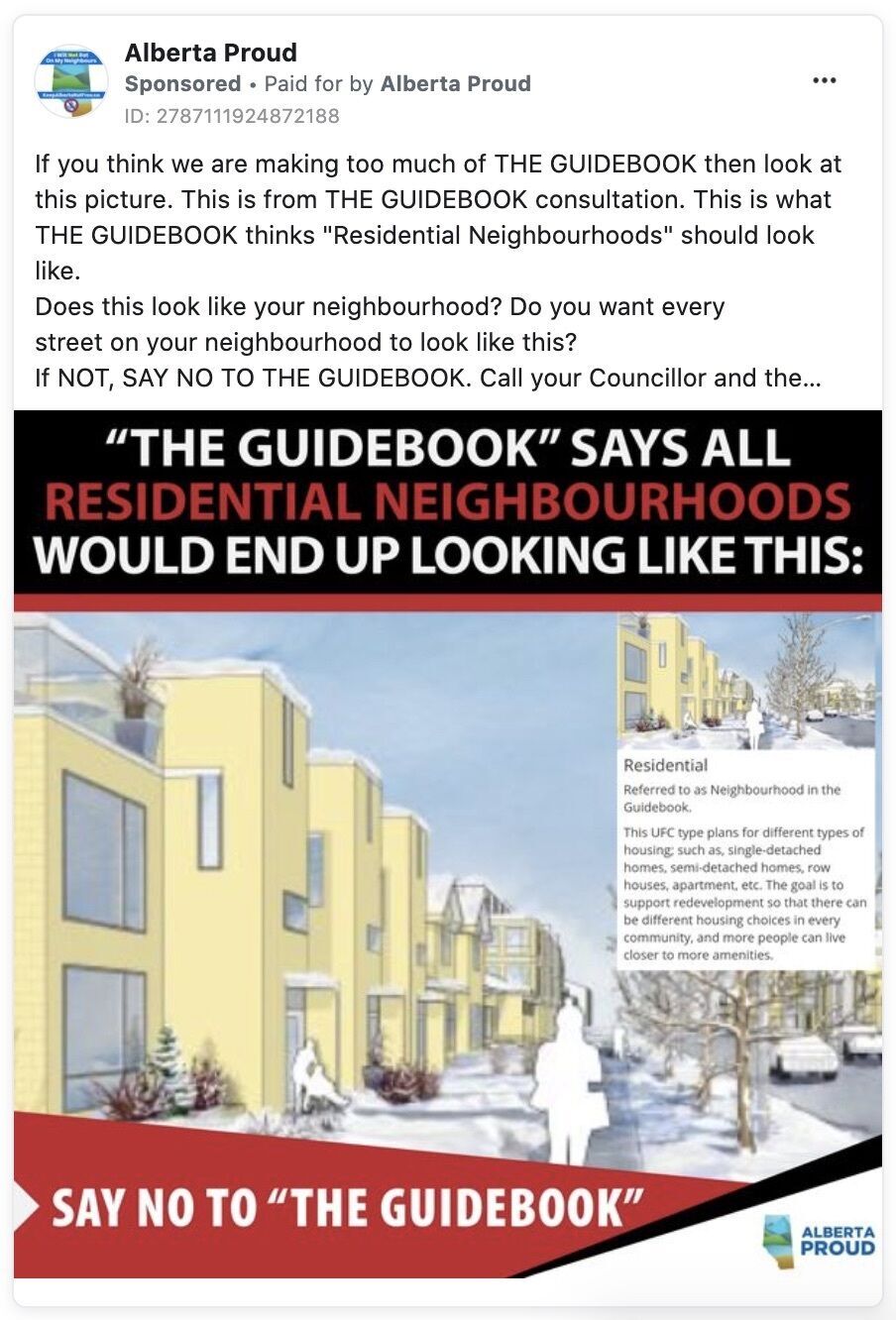
Ward 13 council candidate Dan McLean also purchased an ad that is identical to a meme from one of the Alberta Proud ads that ran this week, complaining about three-story row houses with the tagline, “Just Imagine the Gridlock.”
That ad’s disclosure lists Ontario Conservative MP Pierre Poilievre as the “agent name.” However, McLean campaign spokesperson Patrick Poilievre—who is Pierre’s brother—says it should say his name, not Pierre’s.
Alberta Proud has no direct affiliation with McLean’s campaign, although their views align on certain topics, such as the guidebook, Poilievre added.
Representatives of Alberta Proud couldn’t be reached for comment.
Calgary’s Future
An outlier among PACs for the upcoming election, left-leaning Calgary’s Future—also known as Calgarians for a Progressive Future—has been encouraging people to contact their elected representatives and support the guidebook.
The group’s financial disclosures show it raised over $1.7 million from July 2019 to December 2020, mainly from CUPE Locals 37 and 38, which represent city workers and the Amalgamated Transit Union Local 583.
Calgary and District Labour Council president Alexander Shevalier is listed as the group’s lead. He couldn’t be reached for comment.
The PAC hasn’t purchased any ads in support of the guidebook, but has been expressing support on social media. “Some groups want to mislead Calgarians with alarmist exaggerations and dog-whistles,” a recent post reads. “We know Calgarians are smarter than that.”
The group’s posts link to a form letter sent to each individual councillor, urging them to support “policies that will stop the sprawl, and keep our schools and pools open.”
Jeremy Klaszus is editor-in-chief of The Sprawl. Jeremy Appel is The Sprawl’s municipal politics reporter.
CLARIFICATION 03/20/21: This story was updated after the Hillhurst Sunnyside Community Association issued a statement saying that it is not against the guidebook.
Support independent Calgary journalism!
Sign Me Up!The Sprawl connects Calgarians with their city through in-depth, curiosity-driven journalism. But we can't do it alone. If you value our work, support The Sprawl so we can keep digging into municipal issues in Calgary!




